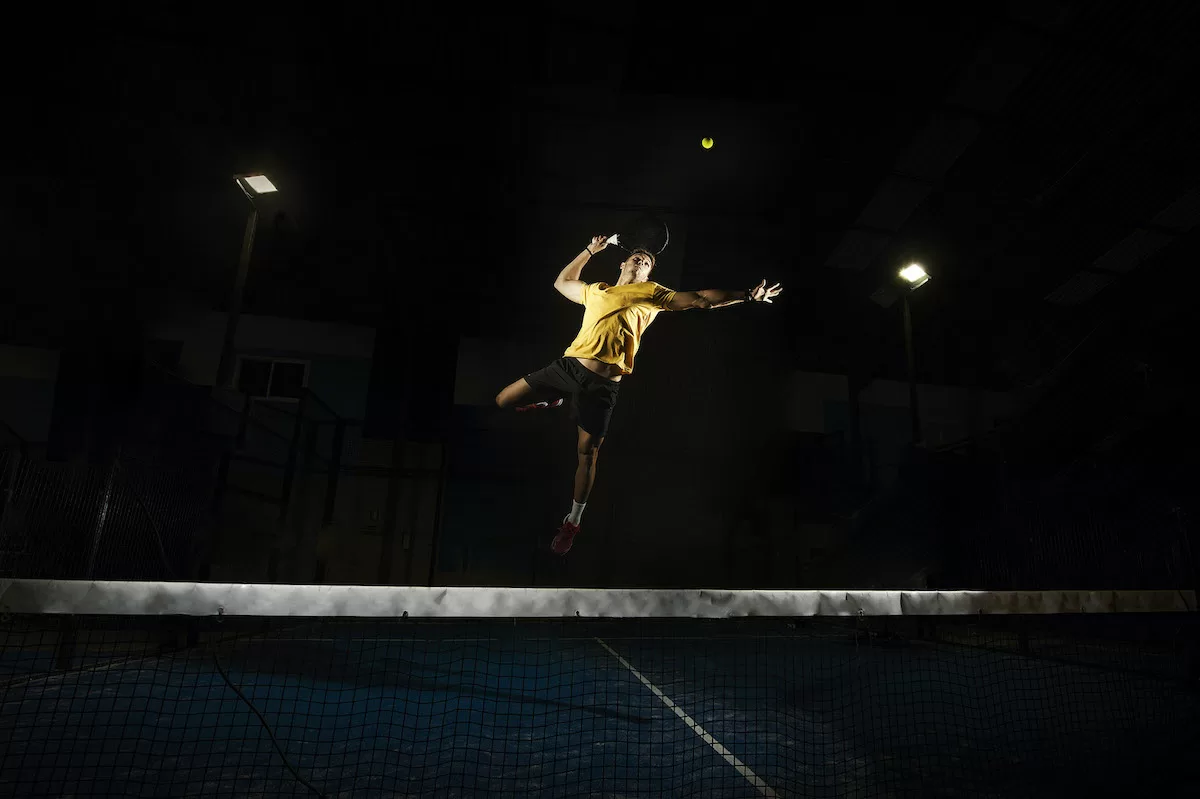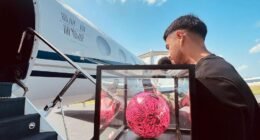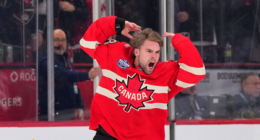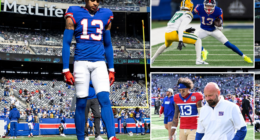The following is an excerpt from “Once A Giant” by Gary Myers. This book tells the story of the 1986 Super Bowl champion Giants with new interviews.
Mark Bavaro’s house north of Boston is the epitome of New England charm. He has a room with football memorabilia, but it is understated, fitting his personality, and really nothing about him is a dead giveaway that he’s a two-time Super Bowl champion, an ultra-physical player who was the best tight end in New York Giants history.
Except the rows of prescription bottles on the island in his kitchen that he was actively taking.
“Look in here,” he said, opening a kitchen cabinet.
Just as many bottles. This was the first group of the pills he no longer needs. Altogether between the island and the cabinet, there are enough pills to take care of an entire football team and practice squad.
They are all for him.

Bavaro suffered from a debilitating case of long-term Covid, and until doctors finally found the right cocktail of pills to settle him down after a six-month struggle, his anxiety, paranoia, dizziness, fogginess, and headaches had him believing life was no longer worth living. It had him sitting up at night contemplating suicide.
“You think about it,” he said. “You’re like, ‘What the f–k?’ You’re on top of a burning building and how long can you stay there until you jump off? You come to understand a lot about other people and what they go through.”
This seemingly indestructible former All-Pro who symbolized the heart of blue-collar New Yorkers in his playing days, who ran over and dragged half the 49ers defense on an inspiring run-after-the-catch at Candlestick Park in 1986 on the Giants way to winning Super Bowl XXI, was overwhelmed by a disease that was new even to the pain-wracked fraternity of former football players. Death, he debated in his darkest time, had to be better than the nonstop turmoil raging in his brain that had been attacked by Covid. And he had to wonder whether he had been made more vulnerable by all the hits to the head he sustained playing football. He won’t blame football but won’t rule it out.
Bavaro went to Notre Dame with safety Dave Duerson, and they later played together on the Giants 1990 Super Bowl championship team. He played one season with hard-hitting safety Andre “Dirty” Waters in Philadelphia at the end of his career. He never played with Hall of Fame linebacker Junior Seau, but they became friends through defensive end Burt Grossman, a teammate of Seau’s in San Diego.
Duerson, Waters, and Seau all were diagnosed with CTE. The diagnosis can only be made posthumously. They all died by suicide, and their families donated their brains for CTE research and evaluation. Bavaro couldn’t quite make sense of it. Could life be so bad that you make the choice to leave behind wives, children, grandchildren, parents, and friends? Wasn’t it the coward’s way out? Didn’t only selfish people check out and take their own life?

In the depths of his battle with Covid, he started to think about it. Bavaro never planned how to end his life, but “you think of ways. How does one die?” he said. “I was praying for a heart attack.”
Even with an ablation procedure in 2015 to treat atrial fibrillation, Bavaro’s heart was beating strong. It meant he would have to consciously decide to leave his wife Susan and his adult children. The debate kept raging inside him. The pain wasn’t football pain. He long ago became conditioned to feeling like crap on Monday mornings and just about every morning during his playing years. It was his emotional side that was damaged, insisting life really sucked with no end to his misery in sight. “I had to stick to my intellectual side and say, ‘Your life is good,’” he said. “Before I got sick, I was happy as a clam playing golf and hanging out. I was not making a ton of money but was making enough to get by. The kids were great, the wife’s great, everything was great. There was nothing to be depressed out.”
His mind was playing tricks. Should he listen to his emotional side, the dangerous side? Or the intellectual side, the rational side. He wanted to believe the intellectual side, but the emotional side was presenting a strong argument. The intellectual side had lost its credibility. “Things were so bad that I wished I was dead,” he said. “I wished that somehow, I would just die. Once you get to that point…”
He went on antidepressants, and they magnified his suicidal thoughts, which he learned could be a side effect, and a side effect of COVID as well. He sat up nights in his living room chair trying to convince himself that life was indeed good and the train would soon get back on the tracks. “My body and mind were out of whack,” said Bavaro, who was sixty years old in April.

He came to understand how Duerson, Waters and Seau pulled the trigger, but Bavaro’s intellectual side fortunately won out. He didn’t point a gun at himself or line up a lethal combination of pills or drink himself to death or go out on the streets of Boston and buy a lethal amount of crack to smoke.
Even if he hated the nickname teammates gave him as a rookie in 1985, he was still the person who’d earned it: Rambo. Bavaro was a tough guy, and he would not give in.
He’d never liked the nickname, which he believed was disrespectful to Vietnam veterans, including some in his own family. (In the movie, Rambo is a Vietnam veteran.) Still, Bavaro’s toughness was legendary.
Early in the first quarter of one 1986 game, he took a short pass from Phil Simms, broke a tackle by Saints safety Frank Wattelet and ran upfield before he was brought down and injured by a helmet-to-facemask hit by cornerback Antonio Gibson, with Wattelet falling on top of him. Bavaro suffered what was initially reported to the media during the game as a chipped tooth.
Turned out he had a broken jaw.
“I’m telling you, I’m looking at him, and there’s blood gushing under his teeth,” Bill Parcells recalled. “And they put on this stuff where they can just throw it in your mouth and it stops the bleeding. They get that done. [Team dentist] Dr. [Hugh] Gardi does that. And then they take him in the dressing room, because they’re going to x-ray him.”

The x-ray room was in the corridor down the hall from the locker room in the bowels of Giants Stadium. “I remember them saying it looked fractured but that the x-ray machine in the tunnel was not high quality,” Bavaro said. “So, they weren’t sure how bad it was, if it was broken. I knew something was wrong because I could feel my teeth moving and there was nothing wrong with them. It was the bone moving. That’s why there were initial reports that I had some teeth knocked out. There was a lot of blood, too, but I’m not sure from where, which added to the story. They suspected a broken jaw but couldn’t say definitively, otherwise they probably wouldn’t have let me return to the game.”
The Giants were down 17–3 when Bavaro came back out of the tunnel late in the second quarter. “So the game is going on,” Parcells said. “And all of a sudden, Bavaro hits me in the back.” Parcells imitates a grunting sound he said Bavaro was making. “That means, ‘I’m ready to go,’” Parcells said. “He catches a touchdown pass. He was something. I loved him.”
Bavaro would catch a 24-yard pass to set up his 19-yard touchdown from Simms before halftime, inspiring a 20–17 victory. He finished with seven catches for 110 yards. The next morning, he was in the dentist’s chair having his mouth wired shut. It stayed that way for five weeks, but he kept playing. He brought a blender on the road and sipped eggplant parmigiana through a straw.

BAVARO’S HEALTH STRUGGLES go back to April 4, 2021. Bavaro’s daughter, husband, and their baby came over to the house for an Easter Sunday visit. The next day, his daughter and her family were not feeling well and all tested positive for Covid. “I was holding the baby,” Bavaro said. He had not yet been vaccinated and was in close contact. “No one else caught it from them. It was just me,” he said.
He played golf the next two days after Easter and came home the second night feeling like he had a cold. “I knew I had it,” he said. “I just assumed it was Covid.”
That began an odyssey that inflicted more mental and physical pain than anything he experienced during his nine-year career in the NFL. His wife Susan, who finished up law school at Harvard, believes the problems caused by Covid trace to his football days before the NFL adopted a concussion protocol. Her research led her to conclude that viruses such as Covid attack the most vulnerable part of the body, which in Bavaro’s case quite possibly was his brain, which had rattled inside his skull with each jarring hit. “I know my wife wants to make that claim and she may be right,” Bavaro said. “I just don’t want to come off that I’m laying the blame for my Covid woes on the NFL.”
Week one after contracting Covid was bad. “It never went to my lungs. It went to my head,” he said. “And my head was just swirling.” Week two was worse. He still felt like he had a cold. He was having trouble sleeping, so he stayed up late, trying to get tired. It was just about bedtime. Susan was already asleep upstairs and Bavaro was in the kitchen of his four-bedroom house. He started to feel light-headed and found himself on the kitchen floor. He had passed out. “I had just enough strength to get to a chair by the island in the kitchen,” he said.
“You think about it. You’re like, ‘What the f–k?’ You’re on top of a burning building and how long can you stay there until you jump off? ”
Susan called paramedics. They checked his vitals, which were fine, and he avoided a trip to the emergency room.
But it wasn’t over. He developed insomnia, which went on for months. The day after passing out in the kitchen, he had a good day. He stayed up late again, way after Susan, knowing he was going to have a tough time falling asleep. He made it up the stairs to the bedroom without a problem and lay down in bed. That’s when it hit him.
“It was like a tornado going on in my head and I couldn’t stand it,” he said. “It was driving me crazy.” He didn’t want to wake up Susan, but he couldn’t fall asleep. He got up to go the bathroom two steps from his bed. “I felt this click and clench in my gut, my diaphragm, and it radiated up,” he said.
He remembers thinking to himself, S–t, I’m going to pass out again.
Bavaro made it back to the edge of his bed and sat down facing the bathroom door. Susan picked up her head. “You okay?” she asked.

He stood up to try to make it to the bathroom again. He passed out again and this time the fall was violent. He went down face first on the threshold to the bathroom. “The next thing you know, I was on the floor of the marble tile of my bathroom in a pool of blood,” he said. “Blood was just pouring out of my nose.”
Susan called 911 again. This time when the ambulance came, they took him to the ER. He was told in the ER that he was dehydrated. He was there for five hours, but he said it took three hours for them to administer fluid. He needed stitches to sew up the inside of his mouth.
He had wrenched his neck. He had unforgiving headaches. His face was black and blue. “That was the beginning of all my troubles,” he said. “There were months, months, where I just wanted to die. I really did.”
“I really ripped my nose up. I think I had a concussion. And my neck was off,” he said. “The hat trick, you know. I had three things going on. I was a wreck. I was a mess.”
At least he didn’t break his nose. That surprised him. “Lots of stitches and lots of divots in what used to be a pretty smooth nose,” he said. “I can still feel the blow two years later. I don’t know the exact cause of the black and blue. No one seemed too interested in it.”

Bavaro received the Covid vaccine two months after he was infected. He considered getting the shot before he got Covid but had not made up his mind, and, besides, it was not yet readily available for his age group. For months after the fall in the bathroom, he had a swollen feeling in his sinuses, his head felt full, and every time he told friends he was turning the corner, things instead turned bad again. He was stuck in a vicious cycle. “My head was bursting at the seams,” he said. “It felt like my brain was boiling. I couldn’t move. I had fatigue. The noise in my head was just unrelenting.”
At least he had Susan to care for him. Bavaro couldn’t even get out of bed, but then she got Covid and was sick for ten days. His sons came from New York and stayed in the house in Boxford for two weeks taking care of them. “We were both in bed,” Bavaro said. “It was like ‘Willy Wonka,’ you know, the family that stayed in bed.”
Once Susan recovered, she began taking Bavaro to doctors. A lot of doctors. The NFL Players Association negotiated a new plan for health care in the collective bargaining agreement in 2020 that helped with Bavaro’s medical expenses. He started to feel a little better by August 2021 and decided to participate in a card signing show in Poughkeepsie, N.Y., with former teammates Lawrence Taylor, Joe Morris, and Rodney Hampton. “Halfway through, I almost passed out again,” he said. “I had to leave. It was embarrassing.”
Bavaro’s road to recovery from Covid included many twists. A chance conversation with a longtime Giants employee helped guide him to the NFL Trust program at Massachusetts General Hospital at the end of September 2021. He was prescribed new meds that eventually helped calm his “out-of-whack” nervous system and new psychiatrists with whom he found a connection. Six weeks later, he began to feel better.
“I think that saved my life because I was teetering on the edge,” he said.
During his most helpless moments, doctors had been telling him to relax and try breathing exercises. “I said, ‘Breathing exercises? My f–king body is on fire. Breathing exercises aren’t going to help.’”

Lexapro, Zoloft, Celexa. Bavaro can recite just about every antidepressant and the one thing they had in common: “None of them worked,” he said. “They made things worse.” His body would tremble and almost convulse from anxiety. He was given anti-seizure medication. He was given Lyria for his nerves, propranolol to control his accelerated heart rate. The new doctors gave him lamotrigne to treat seizures. He believes the fall in the bathroom caused his neck to pinch his brainstem. He couldn’t move his neck or sleep. Trazodone helped.
Before the new meds had time to kick in, his anxiety was raging through his body and mind. Susan insisted on an October trip to the ER. It was a Friday at one o’clock when he and Susan left for Boston, and the traffic was a mess. Bavaro knew the longer he waited, the longer it would take to get downtown, so he finally gave in but was freaking out right away. “I couldn’t sit in a car,” he said. “It’s going to be a nightmare. I’m going to be sitting in traffic for God knows how long. An hour. I’ll lose my mind. I can’t do it.”
He was having a panic attack. “Whatever caused anxiety in my brain was just going off for some reason,” he said. “It affected my emotions so bad. I’ve never felt that alone, that hopeless. I mean, it even affected my faith. I didn’t feel any presence of God. I felt total abandonment. No hope.” He was crying. He cried all the time. “I was afraid of everything. Everything was a worst-case scenario,” he said. “I was afraid to go in the car.”

But he knew he had to go. And his car did not break down on the ride to Mass General.
He was admitted to the emergency room at 2:30 p.m.
“Sedate me, do something,” he pleaded with doctors.
It wasn’t until 10 p.m. that he was given Ativan to calm his anxiety and agitation, but fortunately the medication he had taken at home had finally kicked in right around the time he arrived at the ER. An MRI at the hospital showed micro-hemorrhaging in his brain, which irritated the scar tissue doctors told him may have been caused by football injuries and exacerbated by the fall in the bathroom, triggering the dizziness caused by Covid. “I told the doctor I had not had to take Seroquel, and I would get so proud,” he said. “The psychiatrist said, ‘You’re supposed to take it, Mark. You’re not supposed to be running into brick walls, and it’s not an accomplishment that you don’t need it but you suffer through it.’ I had been so conditioned to tough it out. He told me the medicine was there to help.”
By the end of 2021, Bavaro had tapered off all his medication but lamotrigine. “It’s anti-seizure, antianxiety, and it’s a drug they give you for manic depression,” he said. “But it lets you keep the happiness part.”
In the summer of 2022, he finally started feeling more like himself. He was back to playing golf, one of his passions. But even that came with a price. He took a half swing to get out of the rough and a rock flew up so quickly it struck Bavaro in the eye before he could close it. He had lightning bolts interfering with his vision, sending him back to the emergency room.
Diagnosis: Scratched retina.
By then, it was just piling on.
Excerpted from Once A Giant: A Story of Victory, Tragedy, and Life After Football by Gary Myers. Copyright © 2023.
Available from PublicAffairs, an imprint of Hachette Book Group, Inc.
Book Signings
“Once a Giant” author Gary Myers will be doing two book signings, both featuring Giants legends.
On Sept. 14, he will be at Bookends at 211 E Ridgewood Ave in Ridgewood, N.J. with Phil Simms at 6 p.m.
On Sept. 21, he will be at Meller’s Sports Hub and Grill at 1702 Second Avenue in NYC with Harry Carson and Leonard Marshall at 7 p.m. prior to the Giants-49ers game.







